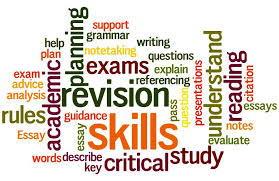|
IMPROVING STUDY SKILLS
SET UP A SCHEDULE. For classes that are harder, make sure you give yourself more time to study or do homework. Also, make time for recreation and social activities; they are just as important as your grades. For classes that are harder, make sure you give yourself more time to study or do homework. Also, make time for recreation and social activities; they are just as important as your grades.
 START STUDYING FOR 10-15 MINUTES AT A TIME AND THEN BUILD UP TO LONGER PERIODS OF TIME. Start reading/studying for 10-15 minutes. Then, build on that by 10 minutes once you become comfortable studying for at least an hour at a time. Work hard, but be realistic. If you can no longer concentrate or remember what you have read, stop. Do not waste valuable time. START STUDYING FOR 10-15 MINUTES AT A TIME AND THEN BUILD UP TO LONGER PERIODS OF TIME. Start reading/studying for 10-15 minutes. Then, build on that by 10 minutes once you become comfortable studying for at least an hour at a time. Work hard, but be realistic. If you can no longer concentrate or remember what you have read, stop. Do not waste valuable time.
 TAKE BREAKS. Take breaks when studying. Do not attempt to cram! Study small portions of material, take a break, and then study some more. You will retain more information when you break it down into smaller portions that you can manage. You do not want to get burned out. TAKE BREAKS. Take breaks when studying. Do not attempt to cram! Study small portions of material, take a break, and then study some more. You will retain more information when you break it down into smaller portions that you can manage. You do not want to get burned out.
 REWARD YOURSELF. Reward yourself for studying, learning a difficult topic, or completing a project. Go to a movie, spend time with your friends, or do the things you put off in order to study. You are more likely to study again and concentrate, if you know there is a reward at the end of completing a task. REWARD YOURSELF. Reward yourself for studying, learning a difficult topic, or completing a project. Go to a movie, spend time with your friends, or do the things you put off in order to study. You are more likely to study again and concentrate, if you know there is a reward at the end of completing a task.
 FIND A GOOD LOCATION. Where you study can determine how much you concentrate. Make sure the place is comfortable, but not too comfortable. Sitting at a desk or table is best. Avoid lying across the bed. You want to try to study in the same type of situation that you will be testing. This helps with remembering the things you studied for the test. FIND A GOOD LOCATION. Where you study can determine how much you concentrate. Make sure the place is comfortable, but not too comfortable. Sitting at a desk or table is best. Avoid lying across the bed. You want to try to study in the same type of situation that you will be testing. This helps with remembering the things you studied for the test.
 USE THE SAME PLACE FOR STUDYING. This will help you with your memory when it is time for a test. It will also help you to concentrate better, because you will be in a routine or habit of studying in the same place. USE THE SAME PLACE FOR STUDYING. This will help you with your memory when it is time for a test. It will also help you to concentrate better, because you will be in a routine or habit of studying in the same place.
 MAKE SURE IT IS A QUIET PLACE. Having a quiet place to study is also important. Playing your favorite CD, or radio station, or even the TV will get in the way of you concentrating on your studies. MAKE SURE IT IS A QUIET PLACE. Having a quiet place to study is also important. Playing your favorite CD, or radio station, or even the TV will get in the way of you concentrating on your studies.
 ELIMINATE THE OBVIOUS DISTRACTIONS. Talking on the telephone is a major distraction when you are trying to study. Other distractions that you should look out for are the radio, TV, video games, and your family talking around your study area. Even seeing your books for another class can distract you, so put them away until you are ready to study for the next class. Once you get rid of as many distractions as you can, you will improve you study skills. ELIMINATE THE OBVIOUS DISTRACTIONS. Talking on the telephone is a major distraction when you are trying to study. Other distractions that you should look out for are the radio, TV, video games, and your family talking around your study area. Even seeing your books for another class can distract you, so put them away until you are ready to study for the next class. Once you get rid of as many distractions as you can, you will improve you study skills.
 EMOTIONAL MOODS. Try studying in a similar emotional mood you have during a test. This also increases your memory during testing. When you are too relaxed during studying, it does not match the same level of emotions as when testing. This also works in reverse. If you are too psyched-up or tensed during your test, you will not be able to remember what you studied. This is why it is important that you learn to calm yourself down during tests. EMOTIONAL MOODS. Try studying in a similar emotional mood you have during a test. This also increases your memory during testing. When you are too relaxed during studying, it does not match the same level of emotions as when testing. This also works in reverse. If you are too psyched-up or tensed during your test, you will not be able to remember what you studied. This is why it is important that you learn to calm yourself down during tests.
YOU HAVE THE POWER TO DO WELL! YOU MUST HAVE THE MOTIVATION TO PUT FORTH THE EFFORT TO SUCCEED. REMEMBER, HARD WORK PAYS OFF!
| 

